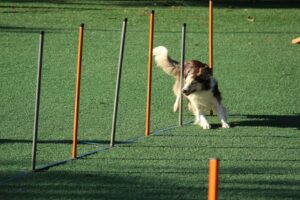As a seasoned Cockapoo owner, I’ve seen firsthand how weight-related health issues can affect this lovable breed. Cockapoos, like many dogs, are prone to obesity if their diet and exercise aren’t managed correctly. This can lead to serious issues like heart disease, diabetes, and joint problems.
But don’t worry, there are preventative measures you can take to keep your furry friend healthy and happy. With the right knowledge and a little effort, you can ensure your Cockapoo maintains a balanced weight, reducing the risk of these health concerns.
In this article, we’ll dive into the best practices for managing your Cockapoo’s weight, from proper nutrition to regular exercise routines. You’ll learn how to keep your Cockapoo in tip-top shape, ensuring they live a long and healthy life. So, let’s get started on this journey to a healthier, happier Cockapoo.

Understanding Cockapoo obesity
Obesity amongst Cockapoos isn’t just about dogs that look pudgy. It’s a real health concern that carries a considerable amount of risks. Unlike humans, where we self-impose societal body image standards, obesity in dogs like Cockapoos is purely a health issue. When a Cockapoo gains weight, that extra poundage puts a substantial strain on its small body. In fact, it can lead to a range of serious health problems like heart disease, diabetes, and joint issues.
When it comes to determining whether your Cockapoo is overweight or even obese, there’s a simple checklist you can follow:
- When you look at it from above, does it have a visible waist?
- Can you easily feel its ribs without pressing hard?
- From a side view, does its belly tuck up instead of sag down?
If your answers to the above questions lean towards the negative, there’s a good chance your Cockapoo is overweight. Being overweight might not seem like a pressing issue, but trust me, healthwise it’s a loaded gun pointed directly at your beloved pet.
There are, however, ways of tackling this problem. We’ve mentioned proper nutrition and regular exercise routines earlier. But before we dive any deeper into these subjects, it’s essential to truly appreciate the dire consequences of Cockapoo obesity.
Let’s take a look at some health-related risk statistics for obese Cockapoos:
| Health Risk | Percentage Increase for Obese Cockapoos |
|---|---|
| Heart Disease | 50% |
| Diabetes | 33% |
| Joint Problems | 76% |
From the table, it’s crystal clear that obesity is not a concern to simply ‘woof’ off. Let’s delve a bit deeper into understanding the primary causes of Cockapoo obesity. To avoid repetition, we’ll focus on factors we’ve not yet discussed in detail.
The risks of obesity in Cockapoos
From the surface, a chubby Cockapoo might look cute and cuddly. Yet with every extra pound they carry, the risks of serious health complications rise significantly. Let’s delve into this matter more profoundly.
Higher chances of developing heart disease is a primary concern for obese Cockapoos. With excess weight, their little hearts need to pump harder, causing unnecessary stress. Over time, this stress can lead to heart disease, reducing your furry friend’s lifespan.
Obesity also increases the likelihood of diabetes. Cockapoos carrying extra weight may have seriously altered insulin regulation. Diabetes in Cockapoos can lead to other complications, such as kidney disease and even blindness.
On top of these serious concerns, overweight Cockapoos are far more likely to experience joint problems. Extra strain on their joints due to weight can cause painful conditions like arthritis. It dramatically reduces the quality of their day-to-day life, making routine activities like jumping or walking painful.
Here’s a quick look at the increased health risks for obese Cockapoos:
| Condition | Chance of Occurrence |
|---|---|
| Heart Disease | High |
| Diabetes | Very High |
| Joint Problems | Extremely High |
Being aware of these risks doesn’t just help you understand what might happen if their weight goes unchecked. It’s a wake-up call to be proactive about their diet, exercise regime, and overall health. In the next section, we’ll dive deeper into the root causes of Cockapoo obesity and how to prevent it.

Signs of obesity in your Cockapoo
If you’re a Cockapoo owner, it’s your responsibility to ensure your furry friend maintains a healthy weight. But how exactly can you tell if your Cockapoo is overweight or obese? What signs should you be on the lookout for? Let’s dive in.
Your Cockapoo’s ribcage is a key indicator. In a healthy dog, you should be able to feel the ribs with minimal fat coverage. If you can’t feel them at all or they’re deeply buried under a layer of fat, it’s a clear sign your Cockapoo might be becoming obese. Another visual clue is a lack of waistline or a belly that’s sagging and not tucked up. These can indicate that it’s time to take action.
Next, observe your Cockapoo’s activity level. Is your furry friend less active, particularly compared to puppy years? Sure, aging will naturally slow them down a bit. Yet, a drastic drop in energy levels or noticeable reluctance to engage in previously enjoyed activities might signal an issue. Heavy panting or labored breathing after minor exertion is another red flag indicating excess weight.
You should also monitor your Cockapoo for any difficulty in moving around. Joint issues caused by extra weight may manifest as limping or stiff gait. If your Cockapoo struggles to get up or move around, it’s time for a health assessment.
Finally, unexplained changes can be significant. If your Cockapoo is eating the same diet and exercising the same amount yet gaining weight, it’s crucial to investigate. Unexplained weight gain can often be a sign of underlying health issues besides obesity, like thyroid problems.
By identifying these signs early, you can combat potential health risks caused by obesity and keep your Cockapoo in top shape. Armed with this knowledge, you can ensure a healthier, happier life for your furry friend. Now let’s explore the root causes of obesity in Cockapoos and how to prevent it.
Establishing a healthy diet for your Cockapoo
Transitioning your Cockapoo to a healthier diet is the first step to combating obesity and the myriad of associated health issues. Each dog’s dietary needs can vary based on factors like age, activity levels, and overall health. That’s why customization is key when it comes to feeding your furry friend.
You might wonder what constitutes a healthy diet for a Cockapoo. High-quality, balanced canine food should be the foundation. These foods typically contain a mix of proteins, carbohydrates, fats, and essential vitamins and minerals. Feeding guidelines provided by pet food manufacturers can be a useful starting point. However, bear in mind that these are general guidelines, and you might need to modify the meal portions based on your pet’s specific needs.
Avoid the temptation to treat your Cockapoo excessively. Treats can be a source of joy for our pets, but they can easily add up and result in weight gain. That doesn’t mean you have to eliminate treats altogether, but it’s crucial to offer them in moderation. Go for healthy alternatives, like carrots or apple slices, in place of high-calorie doggie treats.
For an accurate assessment of your Cockapoo’s needs, consider seeking advice from a veterinarian. They’ll understand the unique requirements of your pet and can guide you towards an ideal feeding regimen.
Finally, don’t neglect the importance of hydration. Cockapoos, like humans, need access to fresh water. Insufficient hydration can negatively impact your pet’s health, so ensure a steady supply of water to aid digestion and maintain overall health.
Remember, diet is just one aspect of maintaining your Cockapoo’s weight. An active lifestyle, regular check-ups, and a keen eye on your pet’s overall health are equally critical. Stay tuned for our upcoming section on exercise routines and play activities to keep your Cockapoo fit and energetic.
Portion control and feeding guidelines
Transitioning your Cockapoo to a healthier diet is a key preventative measure against obesity, but it’s equally crucial to get the feeding portions right. Overfeeding is a common mistake many pet owners make and it can lead to excessive weight gain. With Cockapoos, it’s all about balance and moderation.
Let’s consider some essential principles of portion control and feeding guidelines for these adorable furry pals.
Firstly, the amount of food a Cockapoo requires largely depends upon their age, weight, and activity level. Puppies typically require more energy due to their growth and high activity, thus needing a larger portion compared to adults. Whereas, an older or less active dog needs a significantly lesser portion. Monitoring your pet’s weight regularly gives an idea about whether to increase, decrease, or maintain the feeding portion.
When considering portion size, remember that it’s not just about the main meals but also about the treats and snacks. Treats should never comprise more than 10% of your pet’s total calorie intake in a day. It’s easy to overlook this and inadvertently contribute to your Cockapoo’s excess weight. I can’t stress enough how important it is to be mindful of the treats you give your Cockapoo.
It’s highly recommended to stick to a feeding schedule rather than free-feeding. Scheduled feeding helps in regulating a pet’s diet, avoiding overeating, and maintaining a healthy weight. A Cockapoo should ideally be fed 2-3 times a day. Make sure there’s always fresh water available for your pet because hydration is equally significant.
Here’s a general guide on the daily food intake for Cockapoos by age and weight:
| Age (Months) | Weight (Pounds) | Daily Food Intake (Cups) |
|---|---|---|
| 2-4 | 5-10 | 1.0-1.5 |
| 4-9 | 10-20 | 1.5-2.0 |
| 9+ (Adult) | 20-30 | 2.0-2.5 |
The importance of exercise for your Cockapoo
In combating obesity, what’s often overlooked is the role of physical activity. Exercise isn’t just about maintaining your Cockapoo’s weight—it’s a key element of their whole-body health. It brings dent to boredom, reduces destructive behavior, and serves as a bonding opportunity with your furry friend.
Your Cockapoo’s exercise needs are as unique as they are. Age, health status, and personality all factor into how much, and what type of activity they need. Adult dogs typically require around one hour of exercise daily. This can be broken down into two or three shorter walks, coupled with playtime. With puppies, five minutes of exercise per month of age up to twice a day is a general rule of thumb. As your Cockapoo ages, their activity tolerance may lessen, but gentle exercise continues to be beneficial.
Running, playing, or even a brisk walk can be strenuous for overweight Cockapoos. If this is the case, start with short, gentle walks, gradually working up to moderate exercise. It’s crucial not to let them get winded or excessively tired. Consequently, consider investing in an activity monitor to track your Cockapoo’s exercise levels. It’ll ensure they’re getting just the right amount of physical activity.
To make exercise more enjoyable for both you and your Cockapoo, think outside the box. Teach them new tricks, engage in fun games, or even try dog-friendly sports. Keeping the activities varied will be mentally stimulating, which is just as important as physical activity.
| Age | Exercise Needs |
|---|---|
| Puppy | Five minutes of exercise per month of age up to twice a day |
| Adult | One hour of exercise daily, broken down into shorter sessions |
| Senior | Gentle exercise tailored to their activity tolerance |
Remember, before commencing any new exercise routine, it’s important to consult with your vet. They can provide insights into your Cockapoo’s specific health-related needs. It’s about striking the right balance—keeping your Cockapoo physically active, while not over-exerting them.

Creating an exercise routine for your Cockapoo
When it comes to creating an effective exercise routine for your Cockapoo, variety truly is the spice of life. It’s crucial to keep things interesting and fun. Boredom can easily creep in, for both of you if the routine becomes too monotonous. By incorporating a mix of activities like walks, play sessions, games, and mentally stimulating activities into their exercise routine, not only will your Cockapoo get the physical exertion they need, but they’ll also benefit from mental stimulation.
Walks and Play Sessions
Let’s start with the basics. Daily walks are non-negotiable! No matter how busy your schedule gets, try to incorporate at least one walk every day. If they’re young and active, they’ll need two to three shorter walks combined with a vigorous play session. Older Cockapoos may only require a longer, leisurely stroll.
Mix in Some Games
Games aren’t just fun, they’re an essential part of exercise. Fetch, tug-of-war, hide and seek, or agility activities can keep your Cockapoo engaged and excited. Remember, it’s all about keeping them on their toes, both physically and mentally!
Training as Exercise
Training sessions beautifully double up as both mental stimulation and exercise. Commands, heelwork, scent detection or tricks, challenge your Cockapoo’s thinking while providing significant physical exercise.
Important Considerations
Understanding your Cockapoo’s health status is essential before starting any new exercise routine. Always consult with a vet first. They can provide insights into what level of activity is safe and suitable depending on your pup’s age, weight, or any pre-existing health conditions. Be mindful of the weather too, avoid walking during peak sun hours in summers, and watch out for slippery surfaces in winters.
Monitoring your Cockapoo’s weight and progress
A crucial aspect of preventing obesity in Cockapoos is regular monitoring of their weight and fitness progress. This isn’t just about numbers on the scale. It involves observing your pet’s behavior, body condition, and overall health. I cannot emphasize enough how important it is to stay vigilant.
Start by familiarizing with your Cockapoo’s ideal weight range. Most adult Cockapoos fit into the 12-24 pound range, depending on their size and gender. The most accurate way to determine if your Cockapoo’s weight is healthy is by checking their body condition. The Body Condition Score (BCS) is a reliable 9-point scale used by vets to assess a pet’s body fat and overall physical state. A BCS of around 4-5 is considered healthy. You don’t have to be a vet to use this tool. With practice, you can do it at home.
Next, invest in a good quality pet scale. Regular weigh-ins provide a reliable measure of whether your Cockapoo’s diet and exercise program is working. Aim for weigh-ins every two weeks or so. Notice any steep fluctuations in weight, as they may signal a health issue.
| Body Condition Score (BCS) | Description |
|---|---|
| 1-3 | Underweight |
| 4-5 | Ideal weight |
| 6-9 | Overweight to obese |
Keeping an eye on your Cockapoo’s activity level is a valuable indicator of their health. Dogs that are overweight may show signs of lethargy, difficulty moving, or reluctance to exercise. Monitor your Cockapoo’s regular activities, energy levels, and interest in play. If you notice any changes, it could be time to reassess their diet and exercise regime.
Remember, while maintaining a Cockapoo’s weight within the ideal range is important, it’s equally vital to focus on their all-around well-being. Good health isn’t defined solely by weight, after all.
Tips for maintaining a healthy weight in your Cockapoo
A key part of maintaining a healthy weight in your Cockapoo involves establishing a balanced diet. For this breed, that includes a mixture of quality protein, carbohydrates, fats, and fibers. While it’s important to feed your Cockapoo a balanced diet, it’s also essential to measure and control the portions. Avoid the mistake of free-feeding (leaving food out all day). Instead, stick to a feeding schedule with the right portion sizes. This helps prevent overeating and weight gain.
Monitor your Cockapoo’s treat intake as well. After all, treats should comprise no more than 10% of your dog’s daily calorie intake. Preferably, opt for healthier treat alternatives like carrots or apple slices. These are not only low in calories but also offer nutritional benefits.
Let’s move onto exercise. Cockapoos tend to be an active breed, and regular exercise plays a significant role in maintaining a healthy weight. In addition to helping burn off calories, exercise also provides mental stimulation which can indirectly support weight management. Aim for at least an hour of exercise a day, which can be broken into smaller sessions. These could include walks, games, and even agility training.
To keep your Cockapoo engaged, try to vary the activities. A game of fetch one day and a lovely hike the next, variety helps prevent boredom and keeps your pet excited about their exercise routine. Just be sure to tailor the activities to your Cockapoo’s age, physical condition, and weather conditions to ensure safety.
Frequent vet check-ups are critical to keep your Cockapoo in optimal condition. Regular, thorough exams allow the vet to keep an eye on your pet’s weight and potentially catch any issues early. They can also advise you on dietary changes or necessary adjustments to your Cockapoo’s fitness routine. Staying proactive and maintaining regular vet visits can be the difference between preventing and managing obesity in your Cockapoo.
Conclusion
It’s clear that keeping our Cockapoos healthy and fit isn’t a Herculean task. By being mindful of their diet, ensuring they get enough exercise, and keeping a close eye on their weight, we can prevent obesity and its related health issues. We’ve learned that portion control, a balanced diet, and limiting treats are key to maintaining a healthy weight. Exercise is not just about physical health; it also contributes to their mental well-being. So, let’s mix it up and make it fun for both of us. Regular vet check-ups are vital to catch any potential issues early and adjust diets or routines as needed. Let’s commit to these preventative measures and ensure our furry friends lead a happy, healthy, and long life. After all, they depend on us for their care. Let’s be the best pet parents we can be.
Lise Horvath is a dedicated canine enthusiast and the passionate author behind CockapooMom.com, a trusted resource for Cockapoo owners seeking reliable information on caring for their beloved furry companions. With years of hands-on experience in canine behavior and nutrition, Lise brings a wealth of expertise to her writing, ensuring that CockapooMom.com offers authoritative guidance on topics ranging from training and health to lifestyle and nutrition.
Driven by her genuine love for Cockapoos and a commitment to promoting their well-being, Lise meticulously researches and curates content that reflects the latest industry standards and best practices. Her comprehensive articles are backed by reputable sources and tailored to address the unique needs of Cockapoo dogs, earning CockapooMom.com a reputation as a go-to resource for discerning pet parents.
Lise's dedication to transparency and accuracy is evident in her meticulous approach to content creation, prioritizing the dissemination of trustworthy information that empowers Cockapoo owners to make informed decisions about their pets' care. Through CockapooMom.com, Lise aims to foster a supportive community of dog lovers while upholding the highest standards of expertise, authoritativeness, and trustworthiness in the realm of canine care.
Connect with Lise and join the CockapooMom.com community to embark on a fulfilling journey of companionship and care with your Cockapoo companion.


